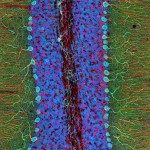Lien vers Pubmed [PMID] – 26060255
J. Biol. Chem. 2015 Jul;290(29):18009-17
The prevalent human ΔF508 mutation in the cystic fibrosis transmembrane conductance regulator (CFTR) is associated with reduced bone formation and bone loss in mice. The molecular mechanisms by which the ΔF508-CFTR mutation causes alterations in bone formation are poorly known. In this study, we analyzed the osteoblast phenotype in ΔF508-CFTR mice and characterized the signaling mechanisms underlying this phenotype. Ex vivo studies showed that the ΔF508-CFTR mutation negatively impacted the differentiation of bone marrow stromal cells into osteoblasts and the activity of osteoblasts, demonstrating that the ΔF508-CFTR mutation alters both osteoblast differentiation and function. Treatment with a CFTR corrector rescued the abnormal collagen gene expression in ΔF508-CFTR osteoblasts. Mechanistic analysis revealed that NF-κB signaling and transcriptional activity were increased in mutant osteoblasts. Functional studies showed that the activation of NF-κB transcriptional activity in mutant osteoblasts resulted in increased β-catenin phosphorylation, reduced osteoblast β-catenin expression, and altered expression of Wnt/β-catenin target genes. Pharmacological inhibition of NF-κB activity or activation of canonical Wnt signaling rescued Wnt target gene expression and corrected osteoblast differentiation and function in bone marrow stromal cells and osteoblasts from ΔF508-CFTR mice. Overall, the results show that the ΔF508-CFTR mutation impairs osteoblast differentiation and function as a result of overactive NF-κB and reduced Wnt/β-catenin signaling. Moreover, the data indicate that pharmacological inhibition of NF-κB or activation of Wnt/β-catenin signaling can rescue the abnormal osteoblast differentiation and function induced by the prevalent ΔF508-CFTR mutation, suggesting novel therapeutic strategies to correct the osteoblast dysfunctions in cystic fibrosis.

